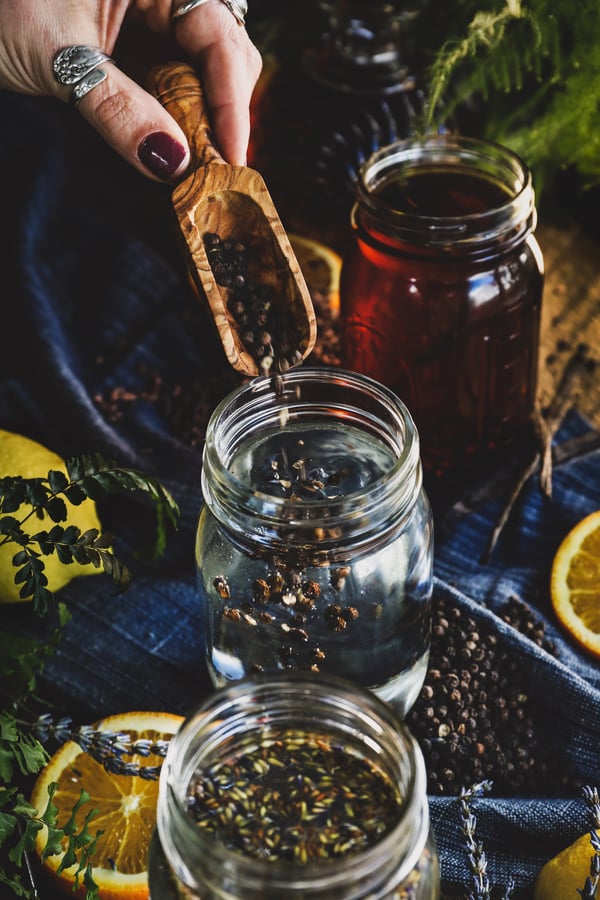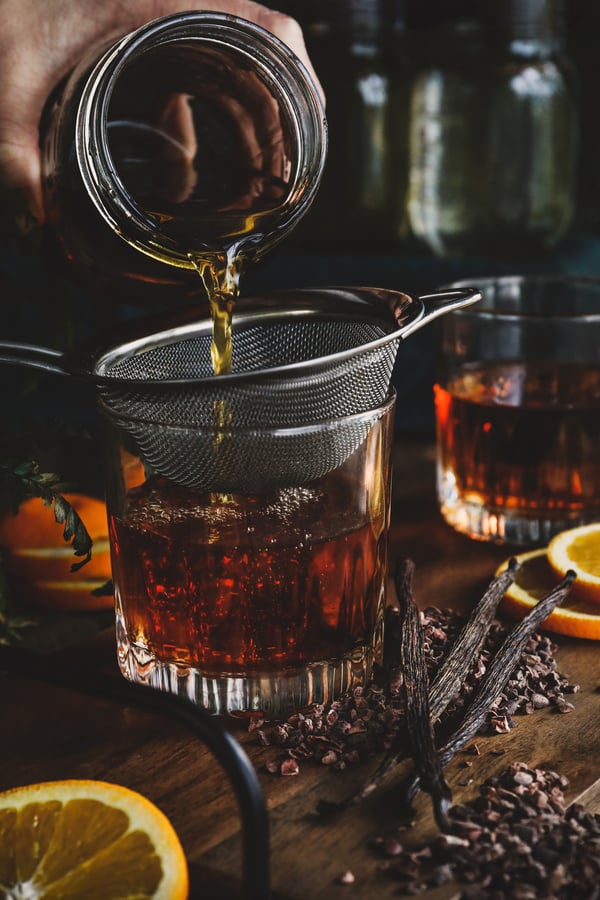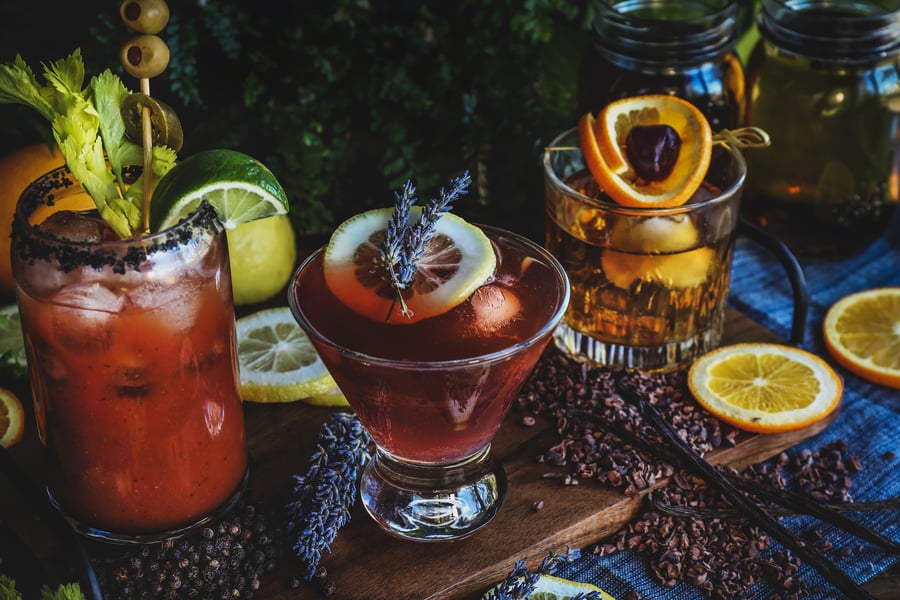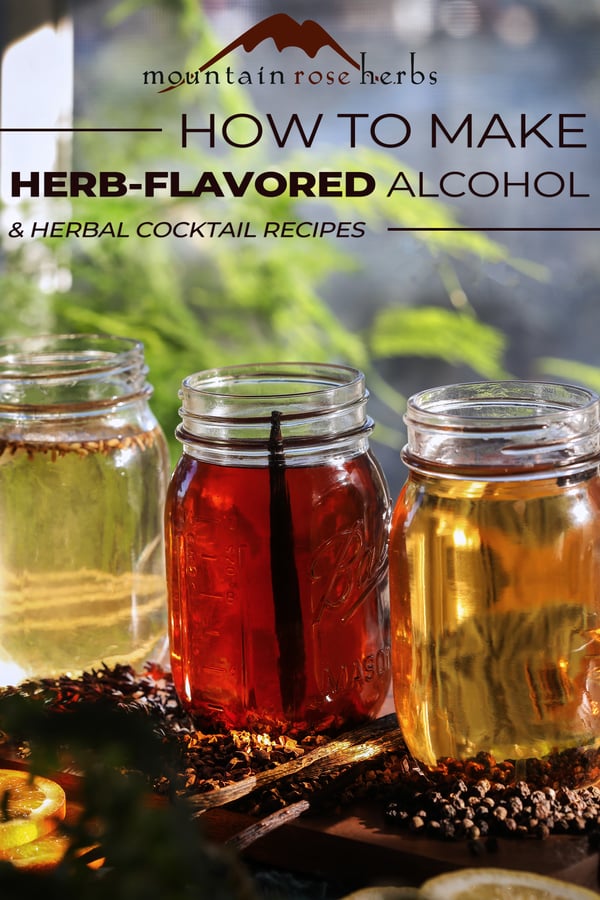In the cycle of the year, I find the weeks between Imbolc (February) and Beltane (end of April) to be a precious, restful time in which I finally have space to be creative. We’re past the months of food preserving and winter holidays and not yet at the point when I will jump back into the annual joy/work of my yard, garden, and orchard. This is the only time of the year when I don’t have a dozen other priorities vying for my attention. It is an ideal moment to take a look at my apothecary and think about the herbs that I should use up before they start to get old. As well as making tinctures, glycerine extracts, and infused honey, I find this to be a perfect opportunity to make herb-infused spirits to add to my liquor cabinet for handcrafted cocktails throughout the year. I recently combed back through Mountain Rose Herbs blogs for inspiration, and—as usual—came up with infusion gold. I’m excited to share three reader-tested, herb-infused distilled spirits recipes with you!
As I mentioned in my blog about making winter cordials to support digestion, making infused spirits is ridiculously easy: add herbs to alcohol in a jar, cap, shake regularly for a few days (or weeks), strain out the herb(s), put your infused alcohol in a bottle with an airtight lid for storage, label it, and you’re done. You only need a few basic items: glass jars for infusing, alcohol, dried herbs, and storage bottles.
How to Choose Alcohol for flavored spirits
If you want to add variety to your home bar, there are a number of alcohols that are excellent choices for infusing with herbs—vodka, gin, whiskey, rum, brandy, sake, and tequila are all wonderful options. Note however that the quality of the alcohol matters when infusing for cocktails. It doesn’t have to be a top-shelf bottle, but bottom-shelf liquors will make bottom-shelf herbal infusions and will impart that less-than-ideal flavor to your handcrafted cocktails. Also, if you’ve never infused alcohol before, start with a “light” alcohol (ie: go for a lighter rum, rather than a dark one) because darker alcohols can be trickier to match with the right herbal flavors. Vodka is one of the most popular options.
Herbal Considerations
The quality of your herbs will impact both flavor and infusion time. Higher quality herbs have more and better flavor, so tend to infuse quicker and with better results. The amount of herb to use will depend on which plant parts you choose and their aromatic strength. You can always add more as you go, so the first time you do this, it’s smart to start with less. Also note that finely ground or powdered herbs are not a good option for infusing because they are hard to strain out again, which means your infused alcohol can end up gritty and, also, any remaining residue in your alcohol will continue to impart flavor over time and throw off the perfect balance of your infusion.
I suggest starting with small batches at first. Making one or two cups is a good way to test flavor development without having to invest too much alcohol or botanicals in an infused liquor that you ultimately don’t like.
Infusion Times
Generally, the herbs should infuse in the alcohol for 3-7 days, but this varies depending on the herbs you use. For instance, hot peppers often need just a couple of hours to infuse properly, whereas a less-intense flavor like lavender might require as much as a week to fully infuse, and an herb like lemongrass might need as long as two weeks to get the perfect lemony zing. You can also choose to infuse herbs for a month or longer to achieve a much more intense flavor. This is why we taste-test infused spirits along the way instead of treating them like a tincture and letting them sit for some pre-prescribed time.
If you want to infuse multiple herbs at once, keep the above guideline in mind. Herbs with very potent flavors, like hot peppers, should go into the alcohol at the end of the infusion period instead of at the get-go with the other herbs. For instance, if you want to make a spicy cinnamon and hot pepper infusion, infuse broken cinnamon sticks until the alcohol reaches a cinnamon flavor you like, then drop in a hot pepper and start to taste-test after 1-2 hours so you don’t overdo it.
How to Infuse Alcohol
Makes about 2 cups infused alcohol.
Ingredients
- 1 tsp. to 2 Tbsp. herb or herb blend of choice
- 2 cups 80-100 proof (40-50%) alcohol of choice
Directions
- Add herb(s) to a clean, dry pint-size jar. Remember, unless you have done this particular infusion before, you may want to start with less herb(s). You can add more later or infuse longer if necessary.
- Pour in alcohol of your choice, seal jar tightly, and shake.
- Label jar with herbs, alcohol, and measurements used.
- Store in a cool, dark place and shake daily for the duration of infusing time.
- Depending on the herb(s) used, begin tasting at day 2 (unless infusing those hot peppers I mentioned above). If flavor is still too light, infuse another day and taste-test again. You can add more herb(s) and/or continue to let the herbs infuse longer. If I’m not in a hurry, I tend to let the herbs infuse longer before making the decision to add more, but either way is fine.
- When infusion reaches ideal flavor, strain out herbs through a fine-mesh strainer lined with cheesecloth or through a paper coffee filter.
- Pour into storage bottles, cap tightly, and label. Store in your liquor cabinet. Alcohol infused with dried herbs will have the same shelf life as the original alcohol.
Pro Tips:
- Want a non-alcohol option? Infuse alcohol-free spirits with your favorite herbs!
- Homemade herb-infused spirits make wonderful gifts. Put into 2 oz. bottles with labels and package with a favorite cocktail recipe!
3 Herbal Spirits Recipes
Roasted Cacao and Vanilla Bean Brandy
Makes 2 cups.
- 1 Tbsp. organic roasted cacao nibs
- 1 organic vanilla bean, split lengthwise and cut to fit in jar
- 2 cups organic brandy
Smoked Peppercorn Vodka
Makes 2 cups.
- 2 Tbsp. organic smoked black peppercorns, broken
- 2 cups organic vodka
Lavender Gin
Makes 2 cups.
- 1 tsp. organic lavender flowers
- 2 cups organic gin
Want to Try Another Herb-Infused Distilled Spirit?
Try This Goji Berry Infused Rum!
You may also enjoy:
- How to Make Homemade Vermouth + Cocktail Recipe
- Hard Apple Cider Cocktail Recipe
- How to Make a Warming Herbal Cocktail with Tinctures














